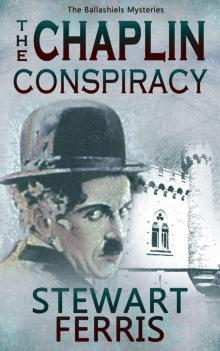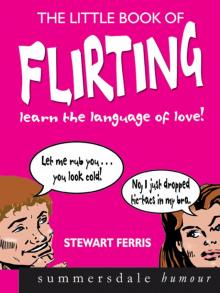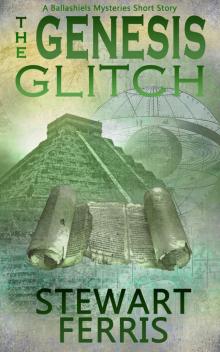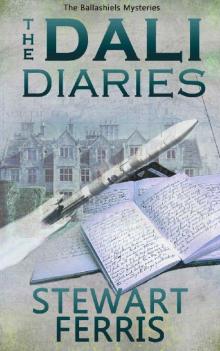- Home
- Stewart Ferris
The Chaplin Conspiracy
The Chaplin Conspiracy Read online
THE CHAPLIN
CONSPIRACY
Stewart Ferris
Published by Accent Press Ltd 2018
www.accentpress.co.uk
Copyright © Stewart Ferris 2018
The right of Stewart Ferris to be identified as the author of this work has been asserted by the author in accordance with the Copyright, Designs and Patents Act 1988.
The story contained within this book is a work of fiction. Names and characters are the product of the author’s imagination and any resemblance to actual persons, living or dead, is entirely coincidental.
All rights reserved. No part of this book may be reproduced, stored in a retrieval system, or transmitted in any form or by any means, electronic, electrostatic, magnetic tape, mechanical, photocopying, recording or otherwise, without the written permission of the publisher:
Accent Press Ltd.
Octavo House
West Bute Street
Cardiff
CF10 5LJ
ISBN 9781786151858
eISBN 9781786151841
Thanks to Rat Scabies for agreeing to take a starring role in this book:
www.ratscabies.com
For Leonardo
FRIDAY 10TH MAY 2013
Film purred through the sprockets of the projector at twenty-four frames per second. A lost and colourless world played out on the screen, waking a long-dead actor for a final performance. Decay was obvious to the nose and to the eye. An acrid whiff of sulphur. Stains that grew and shrank. There could be no doubt that this was authentic cellulose nitrate stock, which made it all the more difficult for those gathered at this private viewing to comprehend what they saw. Despite the deterioration of the reel, an anomaly was plainly visible. They had witnessed something impossible. Someone in the film belonged to another time.
The spool ended abruptly and the harsh white of the lamp revealed the true nature of the improvised screen: a creased bedsheet, stretched across the mahogany panelling in the drawing room at Stiperstones Manor. The tall man standing by the projector, Lord Justin Ballashiels, known to his few friends as Ratty, shrugged his bony shoulders. He looked at the rusty film canister on the table. The label gave no indication of the oddity contained within the footage. In an inky script, paled by a passing century, it simply said: ‘Chaplin 1932’.
‘Is it supposed to smell like rotten eggs?’ asked Ruby Towers, leaning over the back of an itchy art deco armchair. ‘And doesn’t old film risk catching fire?’
Ratty tapped an ancient-looking extinguisher beside him on the parquet floor, failing entirely to reassure her.
‘So what do you make of the film?’ he asked.
‘If I saw what I think I saw,’ said Ruby, ‘there’s only one conclusion.’
‘And that is?’
‘The date on the film tin is wrong. It can’t have been 1932. Let me look at it.’
Ratty passed the tin to her. She wondered if he had misread 1922 as 1932, but even so it wouldn’t have made a difference. The stark and baffling anomaly would remain. She held the label to the light of the projector, but there was no ambiguity in the handwriting. The date was 1932 and it had not been tampered with.
‘I don’t understand,’ said Ruby. ‘It’s a contradiction of reality.’
‘Some clay-brained miscreant could have plopped this reel in the wrong tin,’ suggested Ratty. ‘But those clothes. The fashions. It has to be early 1930s.’
‘And you would know,’ Ruby said with a hint of mockery. Ratty had spent most of his life attired in the tweedy garments of his grandfather’s era, but on the cusp of middle age he had recently taken the bold move of bringing his image in step with the current century. His ancestors would have been appalled by the denim and leather items that now dominated his wardrobe, and that new-found sense of rebellion gave him an agreeable feeling of wayward abandon.
‘Reality is never at fault,’ said a voice from behind a large Chesterfield at the front of the drawing room.
‘Thought you were taking forty winks, Patient chappy,’ said Ratty.
The Patient stood up in the white glare of the screen, sending a cloud of dust spiralling from the sofa into the light.
‘As you must all appreciate, I am unfamiliar with the cinematic works of Charlie Chaplin. In a way, this remains the case, since this film is only a visual record of his vacation and was not intended for commercial release.’ The Patient squinted through the brightness to see if he had his companions’ attention. Sensing this was not the case, he decided to get to the point, but Ruby interrupted before he could continue.
‘Have you seen any films or television before?’ she asked.
‘Well, no.’
‘You haven’t missed much,’ observed Ratty. ‘Hardly your fault, in any case. How long did that rotter keep you locked in his basement?’
‘Forty-five years.’
‘As long as that?’ asked Ruby. ‘Phew, that guy was a monster. What kind of father does that?’
The Patient fell silent for a moment. Ruby wondered if she had been insensitive. Tactfulness was not her thing. But if the Patient had the fortitude to cope with incarceration since birth in a concealed medical facility, interacting with no one other than his pitiless father – and only then in order to endure daily health tests to ensure he could provide spare parts for his twin brother, should they be required – she was certain he could cope with her crassness. Besides, his life hadn’t been all bad, in her opinion. With access to a vast library and no other means of distraction during the decades that it took before Ratty was to cross his path and set him free, the Patient had become arguably the best-read person on the planet. She wondered if, in a small way, she envied the unique opportunity he had been given to devote so much time to books.
‘The facts are undeniable, and we must work within them,’ said the Patient, who retained his descriptive label even though it had now ceased to apply. ‘We must follow the path of logic.’
‘So we know Chaplin went to Europe in 1932,’ said Ruby, relieved that the Patient was focussed once more on the mysterious film.
‘And from my extensive reading on the subject, the Frenchman who appears behind him in the film could not have been present during Chaplin’s visit to France in that year,’ added the Patient.
‘Because this impertinent fellow popped his clogs in 1917,’ said Ratty.
‘Precisely,’ said the Patient. ‘Therefore we have a conflict of two apparent realities. The reality of Chaplin’s presence in France in 1932, and the reality of the French person’s death in 1917. Only one of them can be true. Which one is incorrect?’
‘There are plenty of news archives of Chaplin’s visits to Europe,’ said Ruby, trying not to sound as if she were lecturing her weary students. ‘He even wrote a couple of books about his travels. He can’t have been in France before 1917 because he was in Hollywood making films. And the war was on. France would have been a dangerous place. He might even have been enlisted to fight if he’d returned from America.’
‘So we must consider the possibility that the supposed reality of a Frenchman’s death in 1917 is questionable,’ declared the Patient.
‘What do you think, Ratty?’ asked Ruby.
‘Don’t call him that, girl,’ said the projectionist’s mother, striding into the drawing room with a weighty gin and tonic in her hand. ‘His name is Justin. Did your comprehensive schooling make such things too hard to remember?’
‘Justin,’ muttered Ruby, cursing silently at Lady Ballashiels’ unceasing capacity for irritation.
‘I’m ready to watch the film, boy,’ said the old woman, placing her gin and tonic on a coffee table that had once supported a range of expensive nibbles during a visit by King Edward VII.
‘My name’s Justin, isn’t it?’ Ratty asked, winking at Ruby as he did so. His mother gave no response. ‘And I thought you’d already seen it, Mater.’
‘I once heard your grandfather talking about it, but I was never allowed to see it. They locked it away in the attic long ago. Probably been there since the forties. So rewind it or whatever you have to do,’ she told him, settling herself into the Chesterfield next to the Patient. ‘If you’re serious about finding all that missing gold, it’s entirely possible that the content of this film will give you an edge over everyone else.’
‘I’d like to see it again, boy,’ said Ruby, taunting her friend.
Ratty set up the reel once more. A fresh blast of the sour odour invaded his nostrils. He knew this was a type of film manufactured before such as thing as ‘safety film’ was commonplace. Proximity to the hot lamp of the projector had the potential to create ignition. He picked up the extinguisher and held it ready as soon as the movie started running.
‘That thing’s almost as old as me, boy,’ pointed out his mother.
‘Hush in the audience, please,’ whispered Ratty.
‘It’s a silent movie,’ said Ruby with unnecessary volume. ‘And three people hardly constitute an audience.’
The actor in the film was clowning for his friends. This was a home movie, a record of Charlie Chaplin’s travels in the south of France in 1932. Chaplin was standing on a windswept hill in front of a stone folly, waving at the camera. He pretended to pour a bottle of wine into his ear and puffed out his stomach as if it were filling up with Pays d’Oc. The camera panned clumsily to show the reaction of his companions, a forgotten entourage captured for a moment at the height of health and spirits: thumbs raised, smiles wide. The camera moved once more in the direction of the actor. The panning was smoother now, slow enough to show the details of the distinctive castellated folly. Pyrenean sun illuminated the stone turret and the arched window. Chaplin walked towards the camera using his trademark shuffle, feet splayed uncomfortably apart, his face and body starting to blur as the focus remained fixed on the stone building behind him.
A steel door opened at the top of the turret and a second man appeared. His face was visible. His features were familiar to those who knew his story. Moments later he returned to the interior of the turret, reappearing at ground level behind Chaplin. The camera focus changed, restoring Chaplin to clarity. The man from the turret pulled a shawl over his head as if to hide his identity, then passed closer to the camera, seemingly intent on a discreet departure from the scene. A gust of wind caught his shawl, however, and a frustrated and angry face now filled the shot before exiting to the side. The identity of that face was unquestionable. The square-set features, the dark eyebrows, the robust nose. He was the man who had paid for the construction of the tower. He was the priest who had become inexplicably wealthy after finding something during the renovation of his crumbling church in the late nineteenth century. His name was Bérenger Saunière. And he had died on 22nd January 1917.
Many thought he had died rich. Books had been written about Rennes-le-Château as the possible location of his reputed hoard of gold. Where hundreds before him had failed in their search for the priest’s wealth, Ratty wondered if perhaps he could be the one to succeed. Having no other income with which to maintain the sprawling edifice that was Stiperstones Manor, Ratty might secure the future of his estate with Saunière’s gold.
The image on the makeshift screen bubbled and turned blank, then disappeared. A white flash engulfed the projector. The sprockets seized and the lamp died, replaced by a fierce tower of flame that almost reached the ornate ceiling of the drawing room. Ratty was prepared for this. Pulling the safety pin from the nozzle, he pointed the extinguisher at the inferno.
‘Might as well pour neat gin over it for all the good it will do.’
‘Hush, mother.’
‘Ratty,’ began the Patient, rising to his feet, ‘your mother raises an interesting point with regard to the relative effects of water and alcohol in relation to the chemistry involved in the ignition of nitrocellulose—’
‘Not now, Patient chappy. Just need to get this fire thingy under control.’
Ratty squeezed the handle and prepared to zap the fire. An unhurried stream of water fizzed into the flames and served to spread them further. The intense heat forced Ratty to stagger away from the projector. His spindly legs tripped over the power cable as he did so and caused the table on which the contraption was sitting to fall sideways. The Persian camelhair rug provided fresh fuel for the burning film. Flames spread to the nearest fauteuil, and then to the moth-eaten drapes. A first edition of Hard Times, tinder-dry from its years spent at the edge of a bookcase close to the constant breeze through an ill-fitting sash window, fizzed as its spine erupted.
‘Told you there was something odd in that film, boy,’ said his mother.
‘Perhaps we could discuss it later, dear Mater. Bit of a flagration going on.’
‘Just a little fire. Put it out!’
‘There’s no water left in this thing,’ Ratty admitted, consciously having to raise his voice to be heard above the crackling noises.
‘Oh, for goodness sake, Justin.’
‘As I was saying,’ shouted the Patient, moving swiftly towards the door and beckoning for the others to follow, ‘water has no beneficial effect on fire of this type. In fact, it can make it worse. If we are to avoid the prospect of choking on noxious gases and our unconscious bodies undergoing baking and cremation, we must withdraw from here immediately. Let us learn the lessons of history, In particular I refer of course to the Dromcollogher cinema fire of 1926 in which nitrate film stock ignited and caused the deaths of forty-eight people, and we must not forget the Glen cinema disaster of 1929—’
‘Calm down, Patient chappy,’ interrupted Ratty, once again. ‘You’re getting historical.’ He gathered his emotions with a deep and smoky breath, looking at the floor in shame. ‘I must apologise to you, my friend. My brevity and impertinence are unforgiveable. And, of course, I agree wholeheartedly with your premise, so perhaps it would be propitious for us to retire to another part of the house? One that isn’t burning with quite so much Hadean vigour?’ He looked around the fiery room and realised he was talking to himself.
‘This way, Ratty!’ called Ruby from the corridor before the smoke in her lungs initiated a coughing fit.
***
The Marsaud family rarely celebrated together. Something always went wrong. As their brains filled with red wine, old tensions and disagreements would float to the surface. Bitter arguments would erupt, usually regarding the condition of the family chateau and whether the mediaeval fortress would even remain standing long enough for the younger members to inherit it. Only three rooms on the ground floor were now habitable. The remainder of the castle was derelict, capable of providing a home for nothing larger than bats and pigeons.
The sole human occupants were the current owners, known to the rest of the clan as Grand-mère and Grand-père. They consistently refused to consider the possibility of selling up, despite receiving frequent and sometimes eye-watering offers from wealthy foreigners desperate to own a part of the legendary village. This was not stubbornness. Moving away was not an option. They had a job to do and it necessitated confidentiality on a scale that excluded even their closest heirs. Meanwhile those in line to inherit the castle failed to help with the cash required for urgent repairs. The building was a problem, and with no progress towards disposing of the problem or fixing it, a prickly impasse lingered in their lives.
Today’s celebration was unavoidable, however. Three generations were crammed into the grubby kitchen of the building that gave Rennes-le-Château part of its name. Fifteen souls in the same room, all overwhelmed with the same regret. It was the tenth birthday of the youngest member of the Marsaud clan, Maurice, which had necessitated provision of a fish stew, bouillabaisse. But the birthday wasn’t the reason for the regret; nor was it anything to do with
the noticeable increase in the rate of deterioration of the chateau. For once, the usual causes of conflict were absent. As they vomited and convulsed and flickered in and out of painful consciousness, and as Grand-père tried and failed to form the coherent words necessary to reveal something momentous to his rapidly fading son, they regretted taking up the offer of free catering from a start-up business run by two newly arrived American women.
‘Guess we’d better get to work,’ said Justina, tying her auburn hair into a pony tail as she stepped over the writhing body of a young man. ‘You never told me how that stuff works. How long will they be out cold?’
‘We can take our time,’ replied Winnifred with a flat smile that stretched the wrinkles around her mouth and revealed teeth stained brown from a recent protein shake.
‘Like a couple of hours before they wake up?’
‘Wake up? Hah! They won’t be waking up.’
‘What are you saying?’ whispered Justina with a tremble in her voice.
‘I’m saying we can take as long as we want. The castle is ours. They won’t be needing it.’ Winnifred kicked the nearest body at her feet. There was no response. ‘See?’
Justina dived down and listened for signs of breathing.
‘No, no, no! You’re kidding, right? This can’t be happening!’
‘It’s already happened.’
Justina looked into Winnifred’s eyes, scanning for the merest glint of humanity. She found no comfort there. ‘What the fuck did you do, Winnifred? Sleeping pills in a fish stew. That’s all you had to do! Fucking fish. Poisson and pills. That was all.’
‘Poisson, poison. It’s an understandable mistake. Serves them right for having a dumb language.’
‘I didn’t hire you to kill people!’
‘You only hired me because I’m an expert at tunnelling. Sure, I get it – but I do things my way.’
‘No, Winnifred, this is insane!’
‘Look, you wanted me here because I tunnelled out of three jails, right? Why do you think they put me away to start with?’

 The Chaplin Conspiracy
The Chaplin Conspiracy The Sphinx Scrolls
The Sphinx Scrolls The Little Book of Flirting
The Little Book of Flirting The Genesis Glitch
The Genesis Glitch The Dali Diaries (The Ballashiels Mysteries Book 2)
The Dali Diaries (The Ballashiels Mysteries Book 2)